News
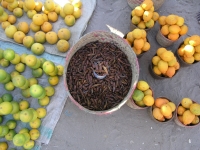
09/04/2021
Edible insects can diversify diets, improve livelihoods, contribute to food and nutrition security and have a lower ecological footprint as compared to other sources of protein. These potential benefits combined with a heightened interest in exploring alternative sources of food that are both nutritious and environmentally sustainable are spurring commercial production of insects as food and animal feed.
While acknowledging the different opportunities that the sector might bring, this publication analyses the food safety implications associated with edible insects. Some key potential food safety hazards for edible insects are considered in this publication - biological (bacteria, virus, fungi, parasites), chemical (mycotoxins,...
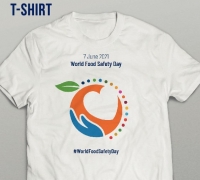
02/04/2021
World Food Safety Day planning is underway. Initiatives will be held around the world and not just on 7 June. Last year events started in May and ran until August. FAO and the World Health Organization (WHO) are planning an online event for 7 June 2021 under the theme ‘Safe food now for a healthy tomorrow.’ Campaign messaging will continue to feature the slogan ‘Food safety is everyone’s business’.
Are you looking to take part? There are numerous ways in which you can do so. Whether you have time for a simple tweet or want to get more involved, UN Days...
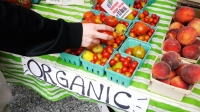
31/03/2021
Organic food is often seen by consumers as healthy, tasty and environmentally friendly, but the organic food certification is not necessarily a synonym for safe food. Organic refers to a product that has been produced in accordance with certain standards throughout the production, handling, processing and marketing stages; it does not refer to the characteristics and properties of the finished product.
In fact, “organic” certification actually indicates the implementation of standards which aim at a different set of benefits: better incomes for small-scale farmers and increased food security, environmental benefits such as improved soil and water quality and biodiversity preservation, and...

26/03/2021
Detecting food fraud is a challenge and consumers who fall prey may find their wallets, trust and even their health damaged as a result. Food safety professionals around the world are dedicated to ensuring that food is safe, but blind spots in food supply chains can provide opportunities for individuals and businesses to conduct food fraud.
Several factors make detection and prevention of food fraud difficult. First, it is not always clear what is meant by food fraud and where the line between food fraud and marketing lies. Second, it may be difficult or impossible for consumers to detect food fraud...

24/03/2021
In his keynote address at the 2021 Global Food Safety Initiative Conference, FAO Director-General QU Dongyu emphasized the urgent need for agri-food system transformation to end hunger and malnutrition and feed everyone on the planet safe and nutritious food. He highlighted several ways to move towards efficient and sustainable agri-food systems.
This year, the three-day conference is being held virtually and centres on a theme of ‘Food Safety: Rethink, Reset, Recharge’. The annual international conference draws more than 1 200 food industry leaders from more than 50 countries to ‘share knowledge, showcase their learnings and do business’.
The photo above, courtesy of...
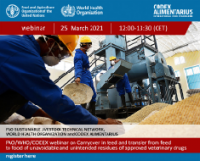
19/03/2021
Manufacturers of feed and feed ingredients, livestock farmers, animal source food producers, distributors and salers need to collaborate to identify and manage potential health threats. Collaboration between these entities enables the development and application of appropriate risk management strategies for safe production and use of medicated animal feed. FAO and WHO convened an expert meeting to review the causes of veterinary drug carryover in animal feed and transfer to food, the known risks of such carryover to human health and international trade and suggest appropriate risk management strategies. The report of this expert meeting will be forwarded to Codex Committee on Residues of Veterinary Drugs...

16/03/2021
Foodborne parasitic diseases do not always receive priorities in national food control systems. Although they can cause both acute and chronic health problems, limited detection and surveillance capacities and extreme under-reporting by those afflicted make the problems invisible to the authorities and the public.
In March 2021, FAO Regional Office for Asia and the Pacific published a booklet entitled “Parasites in foods - an invisible threat”. This concise resource explains the reality of the negative impacts of parasites in food, and provides recommendations for the food safety competent authorities with practical actions to mitigate and manage these neglected diseases.
Parasitic...
.jpg)
15/03/2021
Dietary data reveal important information about food safety as well as nutrition. FAO and WHO are working together to make information available about what people eat and drink reportedly so that governments can estimate dietary exposure to chemical and biological hazards and nutrient intake. The FAO/WHO Global Individual Food Consumption Data Tool (GIFT) collates and shares individual food consumption data that comes from national and sub-national surveys conducted in different parts of the world. The FAO/WHO GIFT is an open access repository of quantitative sex-and-age disaggregated data, which contribute to the assessment of food safety...
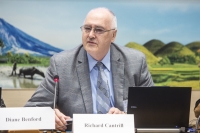
10/03/2021
Richard Cantrill is a food safety and quality consultant with expertise in edible fats and oils and is based in Halifax, Nova Scotia, Canada. He was formerly the Chief Scientific Officer and Technical Director of the American Oil Chemists’ Society. Dr Cantrill was vice-chairperson for the 89th and 90th sessions of the Joint FAO/WHO Expert Committee on Food Additives (JECFA) and chairperson for the 91st, which concluded on 25 February 2021, when the meeting report was adopted.
The meeting chaired by Cantrill evaluated cadmium and ergot alkaloids, and discussed the acceptability of certain substances as previous cargoes as well as the...

23/02/2021
Within Maasai pastoralist communities, milk provides a rich source of nutrients and income, especially for women, and plays a central role in cultural and religious ceremonies. Having milk means having livestock, and having livestock means the continuation of the Maasai people. While a vital nutritional and cultural resource, milk is also a potential food safety risk as well as a vehicle for the transmission of antimicrobial resistance (AMR).
This risk occurs as some Maasai do not boil their milk or observe withdrawal - the period of time necessary for antimicrobial residues to degrade - after administering drugs to their livestock. By...
Stay up to date and connect to our RSS feed!
